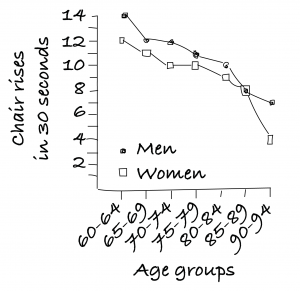Sure, they sound like tests the police might give you to check if you’ve been drinking too much, but these are in fact real ways you can see how well you’re aging, right at home. Why do these correlate so well to survival during aging? Performing these tests requires the heart, lungs, circulatory system, nervous system, and skeletal muscles to work efficiently and together, and therefore reflects the general youthfulness of your body. No wonder one study even found that just knowing your gender, age, and the speed at which you walk, was as accurate at predicting survival as was knowing your gender, age, chronic conditions, smoking history, blood pressure, body mass index, and hospitalization histories1. That’s impressive. So here are the tests, give them a try:
Walking speed test
 This one is a walk in the park. Walk in a strait line, with a known distance of somewhere between 4-10 meters. Time yourself. Determine your walking speed (divide your walking time by the distance walked). Rule of thumb: if your speed is above 1 meter per second (about 100 times faster than a garden snail), you are doing great1.
This one is a walk in the park. Walk in a strait line, with a known distance of somewhere between 4-10 meters. Time yourself. Determine your walking speed (divide your walking time by the distance walked). Rule of thumb: if your speed is above 1 meter per second (about 100 times faster than a garden snail), you are doing great1.
Blinded one leg balance test
 This one sounds the most like an alcohol test. Close your eyes and bend your knee to lift one foot off the ground. How long can you balance? Rule of thumb: make it to 30 seconds and you are a top performer. You can go back into the pub you were just pulled out of, and/or go on living a long healthy life. Actually it’s no joke. One study found that scoring less than 20 seconds (with eyes open though) was associated to having ‘silent’ strokes (lacunar infarctions), something which often precedes actual strokes, and dementia2.
This one sounds the most like an alcohol test. Close your eyes and bend your knee to lift one foot off the ground. How long can you balance? Rule of thumb: make it to 30 seconds and you are a top performer. You can go back into the pub you were just pulled out of, and/or go on living a long healthy life. Actually it’s no joke. One study found that scoring less than 20 seconds (with eyes open though) was associated to having ‘silent’ strokes (lacunar infarctions), something which often precedes actual strokes, and dementia2.
Hand grip strength test
 This is the most well characterized estimate of how you’re physically aging, but it might in fact be the hardest to do at home. You need a hand grip strength tester. I don’t have one. If you have one, squeeze it. Hand grip strength steadily increases throughout youth, peaking somewhere between age 29-39 in men (with a median of 51kg worth of squeeze-power) and 26-42 in women (squeezing a median of 31kg worth). It undergoes a minimal decline thereafter, with a much more obvious decline starting around age 60. While the optimal-health values will be different at each age, let’s put it this way: at the age of 80, half of men squeeze less than 32kg worth, and half of women squeeze less than 19kg worth3.
This is the most well characterized estimate of how you’re physically aging, but it might in fact be the hardest to do at home. You need a hand grip strength tester. I don’t have one. If you have one, squeeze it. Hand grip strength steadily increases throughout youth, peaking somewhere between age 29-39 in men (with a median of 51kg worth of squeeze-power) and 26-42 in women (squeezing a median of 31kg worth). It undergoes a minimal decline thereafter, with a much more obvious decline starting around age 60. While the optimal-health values will be different at each age, let’s put it this way: at the age of 80, half of men squeeze less than 32kg worth, and half of women squeeze less than 19kg worth3.
Chair rise test
 Like all the tests here, there are a variety of ways to do this one too. One way is by sitting in a chair and counting how many times you can stand up (with locked knees) and sit back down, in 30 seconds. This is probably the easiest for you to do right now, since you are reading this and most likely seated. Try it, now. Unlike the hand grip strength test, this one is mainly informative at ages above 60. If you are younger than that though try it anyways and you should aim for getting at least 14 chair rises if you are a man, and 12 if you are a woman in those 30 seconds. Here is a breakdown of what that the Center for Disease Control in the US (CDC) recommends getting at each age group:
Like all the tests here, there are a variety of ways to do this one too. One way is by sitting in a chair and counting how many times you can stand up (with locked knees) and sit back down, in 30 seconds. This is probably the easiest for you to do right now, since you are reading this and most likely seated. Try it, now. Unlike the hand grip strength test, this one is mainly informative at ages above 60. If you are younger than that though try it anyways and you should aim for getting at least 14 chair rises if you are a man, and 12 if you are a woman in those 30 seconds. Here is a breakdown of what that the Center for Disease Control in the US (CDC) recommends getting at each age group:
 Continue reading →
Continue reading →

 This one is a walk in the park. Walk in a strait line, with a known distance of somewhere between 4-10 meters. Time yourself. Determine your walking speed (divide your walking time by the distance walked). Rule of thumb: if your speed is above 1 meter per second (about 100 times faster than a garden snail), you are doing great
This one is a walk in the park. Walk in a strait line, with a known distance of somewhere between 4-10 meters. Time yourself. Determine your walking speed (divide your walking time by the distance walked). Rule of thumb: if your speed is above 1 meter per second (about 100 times faster than a garden snail), you are doing great This one sounds the most like an alcohol test. Close your eyes and bend your knee to lift one foot off the ground. How long can you balance? Rule of thumb: make it to 30 seconds and you are a top performer. You can go back into the pub you were just pulled out of, and/or go on living a long healthy life. Actually it’s no joke. One study found that scoring less than 20 seconds (with eyes open though) was associated to having ‘silent’ strokes (lacunar infarctions), something which often precedes actual strokes, and dementia
This one sounds the most like an alcohol test. Close your eyes and bend your knee to lift one foot off the ground. How long can you balance? Rule of thumb: make it to 30 seconds and you are a top performer. You can go back into the pub you were just pulled out of, and/or go on living a long healthy life. Actually it’s no joke. One study found that scoring less than 20 seconds (with eyes open though) was associated to having ‘silent’ strokes (lacunar infarctions), something which often precedes actual strokes, and dementia This is the most well characterized estimate of how you’re physically aging, but it might in fact be the hardest to do at home. You need a hand grip strength tester. I don’t have one. If you have one, squeeze it. Hand grip strength steadily increases throughout youth, peaking somewhere between age 29-39 in men (with a median of 51kg worth of squeeze-power) and 26-42 in women (squeezing a median of 31kg worth). It undergoes a minimal decline thereafter, with a much more obvious decline starting around age 60. While the optimal-health values will be different at each age, let’s put it this way: at the age of 80, half of men squeeze less than 32kg worth, and half of women squeeze less than 19kg worth
This is the most well characterized estimate of how you’re physically aging, but it might in fact be the hardest to do at home. You need a hand grip strength tester. I don’t have one. If you have one, squeeze it. Hand grip strength steadily increases throughout youth, peaking somewhere between age 29-39 in men (with a median of 51kg worth of squeeze-power) and 26-42 in women (squeezing a median of 31kg worth). It undergoes a minimal decline thereafter, with a much more obvious decline starting around age 60. While the optimal-health values will be different at each age, let’s put it this way: at the age of 80, half of men squeeze less than 32kg worth, and half of women squeeze less than 19kg worth Like all the tests here, there are a variety of ways to do this one too. One way is by sitting in a chair and counting how many times you can stand up (with locked knees) and sit back down, in 30 seconds. This is probably the easiest for you to do right now, since you are reading this and most likely seated. Try it, now. Unlike the hand grip strength test, this one is mainly informative at ages above 60. If you are younger than that though try it anyways and you should aim for getting at least 14 chair rises if you are a man, and 12 if you are a woman in those 30 seconds. Here is a breakdown of what that the Center for Disease Control in the US (CDC)
Like all the tests here, there are a variety of ways to do this one too. One way is by sitting in a chair and counting how many times you can stand up (with locked knees) and sit back down, in 30 seconds. This is probably the easiest for you to do right now, since you are reading this and most likely seated. Try it, now. Unlike the hand grip strength test, this one is mainly informative at ages above 60. If you are younger than that though try it anyways and you should aim for getting at least 14 chair rises if you are a man, and 12 if you are a woman in those 30 seconds. Here is a breakdown of what that the Center for Disease Control in the US (CDC) 